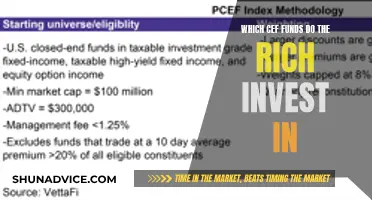
Dimensional Fund Advisors (DFA) is a low-cost, passive mutual fund family based on the work of esteemed finance professors Eugene Fama and Ken French, known as the Fama French Three-Factor Model. DFA funds are no-load (commission-free), low-cost, highly diversified, and tax-efficient, providing a much broader and deeper coverage of the global markets than other mutual funds. DFA's investment philosophy is data-driven and relies on empirical evidence rather than speculation, aiming to deliver reliable results. The company's commitment to rigorous research, data-driven methodologies, and a long-term investment perspective have contributed to its strong performance track record.
| Characteristics | Values |
|---|---|
| Investment approach | Focus on factor-based investing, such as company size, price-to-book ratio, and overall profitability |
| Available to | Institutional investors and clients of select independent financial advisors |
| Investment type | Mutual funds and exchange-traded funds (ETFs) |
| Management type | Passive mutual fund family |
| Performance | Celebrated for great performance but received mediocre performance ratings from Morningstar |
| Advisor access | Only available through approved financial advisors |
| Costs and fees | Lower costs and fees compared to other funds |
| Diversification | Emphasizes diversification across asset classes, geographies, and company sizes |
| Risk management | Provides investors with exposure to a wide range of market segments, including domestic and international equities, fixed-income securities, and alternative asset classes |
| Long-term investing | Encourages investors to adopt a long-term perspective and resist short-term market timing or reacting to market fluctuations |
What You'll Learn

DFA funds are no-load, low-cost, diversified, and tax-efficient
No-load funds are those that do not charge a commission when you buy or sell. This is a significant advantage for investors as it reduces the overall cost of investing. DFA funds are no-load, which means investors don't have to worry about paying commissions and can keep more of their money working for them in the market.
DFA funds are also known for being low-cost. The company aims to keep expenses low by employing systematic investment strategies, minimizing trading costs, and using efficient investment structures. This focus on cost efficiency benefits investors by reducing the drag of expenses on portfolio returns. Additionally, DFA does not pay advisors commissions to recommend their funds, attracting advisors who embrace a passive investment strategy and value education and guidance for their clients.
Diversification is another key strength of DFA funds. They emphasize diversification across asset classes, geographies, and company sizes. DFA offers a range of funds covering various market segments, which can help reduce the impact of individual security or sector risks on portfolio performance. By investing in a deliberately varied portfolio of stocks, investors can reduce their overall portfolio risk.
Finally, DFA funds are designed to be tax-efficient. They encourage investors to adopt a long-term perspective and resist the urge to time the market or react to short-term fluctuations. This patient approach allows investors to benefit from the long-term performance of the market segments they are invested in. DFA's focus on tax efficiency helps maximize returns and minimize the tax burden for investors.
In summary, DFA funds offer a compelling combination of being no-load, low-cost, diversified, and tax-efficient. These features work together to provide investors with a robust investment strategy that can help them achieve their financial goals while minimizing costs and risks.
Mutual Funds: When to Hold Back on Investments
You may want to see also

DFA funds are grounded in rigorous academic research
The DFA approach is influenced by groundbreaking research in finance, including the efficient market hypothesis and studies on factor-based investing. This strategy is based on the idea that certain factors (such as company size, price-to-book ratio, and overall profitability) have historically been associated with better-expected returns. By investing in a diversified portfolio of stocks that have high exposure to these factors, DFA seeks to deliver reliable results and capitalize on them.
The DFA investment philosophy is data-driven and relies on empirical evidence rather than speculation. It has been subjected to extensive peer reviews and replication. The company uses decades of empirical evidence to develop its investment strategies, which appeals to investors who value a disciplined and research-driven investment philosophy. This evidence-based approach has proven successful over the past several decades and has become a preferred mutual fund strategy for investors who share the belief that success is not arbitrary.
The involvement of Eugene Fama, a Nobel laureate, and other leading academics as directors and consultants to Dimensional Fund Advisors is also noteworthy. DFA has direct access to this academic research, allowing them to cut out the middlemen and keep their fees low.
Vanguard Funds: Best Investment Options for Now
You may want to see also

DFA funds focus on factor investing
DFA funds are based on "dimensional" attributes, focusing on factor investing. This approach is underpinned by the work of esteemed finance professors Eugene Fama and Ken French, known as the Fama French Three-Factor Model. This model demonstrates that additional returns can be achieved by tilting portfolios towards smaller and value companies.
The dimensions that impact DFA's investment strategy include:
- The equity premium: Stocks tend to perform better than bonds over the long term.
- The size premium: Smaller companies tend to outperform larger companies over time.
- The value premium: Value companies tend to outperform growth companies over the long term.
- The profitability premium: More profitable companies tend to deliver superior performance compared to less profitable ones over the long term.
DFA's factor-based approach targets carefully selected "premiums" or factors to guide its investment strategy. These factors include relative price, company size, and profitability, which are expected to influence the fund's end results and the investor's bottom line.
By structuring its portfolios to target these factors, DFA aims to provide investors with higher expected returns compared to traditional market-cap-weighted index funds. DFA's factor-based strategies are grounded in rigorous academic research and have been subjected to extensive peer review and replication. This approach takes the emotion out of investing, delivering reliable and robust results over time.
Pension Funds and Hedge Funds: A Match Made in Heaven?
You may want to see also

DFA funds are only available to institutional investors and select advisors
Dimensional Fund Advisors (DFA) is an investment management company that offers a unique approach to mutual fund investment strategies. DFA's investment strategies are primarily available only to institutional investors and clients of select independent financial advisors. This limited accessibility is an important feature of DFA funds.
Firstly, DFA funds are not readily available to the general public. They are only accessible through select financial advisors who have undergone a rigorous and lengthy selection process. This ensures that advisors managing investor accounts understand and respect DFA's philosophy of investing based on academic research and the science of investing. These advisors are well-versed in selecting funds that will provide optimal results based on company size, value, and profitability. They work to educate and provide sound, reliable advice, rather than chasing trends and trying to predict market outcomes. Fiduciary advisors, in particular, are ideal resources due to their obligation to act in their clients' best interests and their expertise in DFA's unique investment strategies.
Secondly, DFA believes that most investors are better served by working with a financial advisor. By going through advisors, DFA can minimize the impact of fund flows in and out of their funds. This helps DFA avoid having to sell or buy at unfavourable times.
Overall, the limited accessibility of DFA funds to institutional investors and select advisors ensures that investors have access to well-diversified portfolios and ongoing guidance, while also allowing DFA to maintain its disciplined and research-driven investment philosophy.
Thailand's Climate Investment Funds: A Historical Overview
You may want to see also

DFA funds are a long-term investment strategy
The DFA investment strategy is based on the idea that certain factors, such as company size, price-to-book ratio, and overall profitability, have historically been associated with better-expected returns. By investing in a diversified portfolio of stocks with high exposure to these factors, DFA seeks to capitalise on them. This strategy is called "factor investing" and is based on rigorous academic research conducted by leading academics in finance.
DFA funds are designed to track a particular index or set of dimensions rather than trying to beat the market with short-term investment decisions. This approach allows investors to benefit from the long-term performance of the market segments they invest in. DFA's factor-based strategy focuses on carefully selecting securities that demonstrate specific factors, aiming to capture systematic sources of risk and long-term market returns.
The benefits of DFA funds as a long-term investment strategy include lower costs and fees, diversification and risk management, and a strong performance track record. DFA funds are no-load (commission-free) and have lower expense ratios, benefiting investors by reducing the drag of expenses on portfolio returns. DFA's mutual fund strategy provides investors with exposure to a wide range of market segments, including domestic and international equities, fixed-income securities, and alternative asset classes, helping to reduce the impact of individual security or sector risks on portfolio performance.
In summary, DFA funds offer a long-term investment strategy that focuses on rigorous academic research, diversification, and cost efficiency. This approach encourages investors to adopt a disciplined, long-term perspective, benefiting from the power of compounding and the long-term performance of the market.
Vanguard Index Fund: Minimum Investment Requirements and Opportunities
You may want to see also
Frequently asked questions
DFA funds are grounded in rigorous academic research and have been subjected to extensive peer reviews and replication. They are also no-load (commission-free), low cost, very diversified, and tax-efficient, providing a much broader and deeper coverage of the global markets than other mutual funds.
Some benefits of investing in DFA funds include academic research basis, diversification, and cost efficiency. DFA funds are also known for their long-term focus, encouraging investors to stay invested and avoid short-term market timing and emotional decision-making.
DFA funds are not readily available to the general public. Investors can only access them through select financial advisors who have undergone a rigorous and lengthy selection process. These advisors can help educate and provide sound, reliable advice rather than chasing trends and trying to predict market outcomes.







